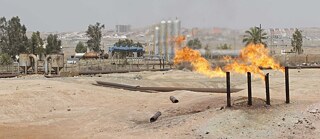Environmental Protection in Kirkuk: Where Politics Follows Art’s Lead

For too long, the environment was not on the agenda of Kirkuk’s political decision-makers. Although the city faces several environmental challenges, little has been done to address them. In this regard, artists are setting an inspiring example, having placed the environment at the centre of social debate. The project “Spotlight Irak”, a programme of the Goethe-Institut Irak, funded by the Federal Foreign Office as part of the Ta’ziz Partnership, provides a glimpse at this new movement. In the project, environmental issues are tackled through installation art.
By Schluwa Sama

Politics and the Environment in Kirkuk
Kirkuk belongs to those cities in Iraq, where environmental issues are often sidelined due to its complex political realities. The city’s status remains contested to this day. According to Article 140 of the Iraqi constitution, a 2007 referendum should have determined whether the city belongs to the autonomous region of Kurdistan or to Central Iraq. While this question remains unresolved, the different parties in the Kurdistan Region and Iraq attempt to tighten and expand their control over Kirkuk. The city’s oil wealth undoubtedly plays an important role in the matter. Another important factor is the risk of attacks by IS sleeper cells, which continue to pose a danger even after the end of the war.
Most people in Kirkuk have grown tired of these quarrels and conflicts along political lines. The city’s population is highly diverse and largely trilingual: Most people grow up speaking or at least understanding Kurdish, Turkmen, and Arabic. “Politics has its own questions, which don’t have much to do with society. We have to live in a city full of rubbish. We, the people, have very different things to worry about”, says Ayeda al-Rubayi, head of the environmental project “Spotlight Irak”.

A famously oil-rich city in Iraq, the gas burned in Kirkuk’s oil refineries can be smelled and seen from quite a distance. Of course, this process increases the amount of greenhouse gases in the atmosphere, a danger to both the environment and people.
Al-Rubayi nods, “I live on the outskirts of the city and can still smell the gas. Officially, there is no pollution, but we can see it with our own eyes. There is also rubbish everywhere in the streets, which is not being disposed of properly”.

Installation Art to Galvanise Society
Ayeda al-Rubayi and her students have chosen installation art to make environmental issues more approachable for the people of Kirkuk. In doing so, it was important to Al-Rubayi to get young artists involved: “One day, I will be no more. Therefore, I set my hope on the work with young people. The environment is a critical issue of the future anyway”. The exhibition is intentionally shocking and thought-provoking.

Materials such as plastic and metal –rubbish bags, rusty scrap metal, or electronic waste – were utilised to sensitise people to environmental issues. Although the governor of Kirkuk had proposed the Citadel as exhibition venue, artists chose the busy shopping mall of Kirkuk – with great success: Around 7,000 people came to see the exhibition, which was also covered by Iraqi media. “People had many questions, and that convinced me that the environment matters to our society. Several people approached me, arguing that we, the people of Kirkuk, needed to tackle these issues ourselves and couldn’t rely on politicians”, Al-Rubayi says. There is thus the impression that environmental protection will grow in importance among the people of Kirkuk and of Iraq, as climate change shifts from the abstract to the everyday reality of citizens.

In the meantime, the exhibition appears to have already made a change on Kirkuk’s political stage. The government launched two initiatives shortly after the end of the exhibition: Rubbish was removed from Kirkuk’s streets and 500 trees were donated and planted. And so it seems that, from time to time, and in spite of all political and social turmoil, politicians do follow the lead of the artists.
Mehr zu Spotlight Irak (goethe.de)